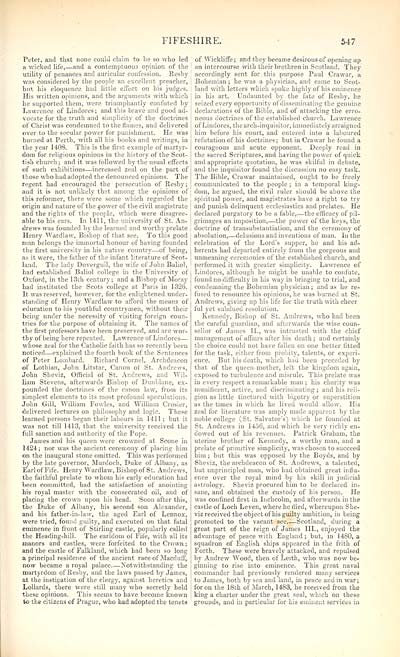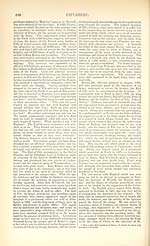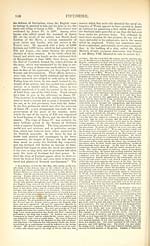Topographical, statistical, and historical gazetteer of Scotland > Volume 1
(641) Page 547
Download files
Complete book:
Individual page:
Thumbnail gallery: Grid view | List view

FIFESHIRE.
547
Peter, and that none coulil claim to be so who led
a wicked life, — and a contemptuous opinion of the
utility of penances and auricular confession. Resby
was considered by the people an excellent preacher,
but his eloquence had little effect on his judges.
His written opinions, and the arguments with which
he supported them, were triumphantly confuted by
Lawrence of Lindores; and this brave and good ad-
vocate for the truth and simplicity of the doctrines
of Christ was condemned to the Barnes, and delivered
over to the secular power for punishment. He was
burned at Perth, with all his books and writings, in
the year 1408. This is the first example of martyr-
dom for religious opinions in the history of the Scot-
tish church; and it was followed by the usual effects
of such exhibitions — increased zeal on the part of
those who had adopted the denounced opinions. The
regent had encouraged the persecution of Resby;
and it is not unlikely that among the opinions of
this reformer, there were some which regarded the i
origin and nature of the fiower of the civil magistrate ]
and the rights of the people, which were disagree- i
able to his ears. In 1411, the university of St. An-
drews was founded by the learned and worthy prelate i
Henry Wardlaw, Bishop of that see. To this good ■
man belongs the immortal honour of having founded j
the first university in his native country — of being, j
as it were, the father of the infant literature of Scot-
land. The lady Doverguil, the wife of John Baliol, '
had established Baliol college in the University of
Oxford, in the 13th century; and a Bishop of Moray-
had instituted the Scots college at Paris in 1326.
It was reserved, however, for the enlightened under-
standing of Henry Wardlaw to afford the means of
education to his youthful countrymen, without their
being under the necessity of visiting foreign coun-
tries for the purpose of obtaining it. The names of
the first professors have been preserved, and are wor-
thy of being here repeated. Lawrence of Lindores —
whose zeal for the Catholic faith has so recently been
noticed — explained the fourth book of the Sentences
of Peter Lombard. Richard Cornel, Archdeacon
of Lothian, John Litstar, Canon of St. Andrews,
John Sheviz, Official of St. Andrews, and Wil-
liam Stevens, afterwards Bishop of Dunblane, ex-
pounded the doctrines of the canon law, from its
simplest elements to its most profound speculations.
John Gill, William Fowles, and William Crosier,
delivered lectures on philosophy and logic. These
learned persons began their labours in 1411 ; but it
was not till 1413, that the university received the
full sanction and authority of the Pope.
James and his queen were crowned at Scone in
1424 ; nor was the ancient ceremony of placing him
on the inaugural stone omitted. This was performed
by the late governor, Murdoch, Duke of Albany, as
Earl of Fife. Henry Wardlaw, Bishop of St. Andrews,
the faithful prelate to whom his early education had
been committed, had the satisfaction of anointing
his royal master with the consecrated oil, and of
placing the crown upon his head. Soon after this,
the Duke of Albany, his second son Alexander,
and his father-in-law, the aged Earl of Lennox,
were tried, found guilty, and executed on that fatal
eminence in front of Stirling castle, popularly called
the Heading-hill. The earldom of Fife, with all its
manors and castles, were forfeited to the Crown ;
and the castle of Falkland, which had been so long
a principal residence of the ancient race of Macduff,
now became a royal palace Notwithstanding the
martyrdom of Resby, and the laws passed by James,
at the instigation of the clergy, against heretics and
Lollards, there were still many who secretly held
these opinions. This seems to have become known
to the citizens of Prague, who had adopted the tenets
of Wickliffe ; and they became desirous of opening up
an intercourse with their brethren in Scotland. They
accordingly sent for this purpose Paul Crawar, a
Bohemian ; he was a physician, and came to Scot-
land with letters which spoke highly of his eminence
in his art. Undaunted by the fate of Resby, he
seized every opportunity of disseminating the genuine
declarations of the Bible, and of attacking the erro-
neous doctrines of the established church. Lawrence
of Lindores, the arch-inquisitor, immediately arraigned
him before his court, and entered into a laboured
refutation of his doctrines; but in Crawar he found a
courageous and acute opponent. Deeply read in
the sacred Scriptures, and having the power of quick
and appropriate quotation, he was skilful in debate,
and the inquisitor found the discussion no easy task.
The Bible, Crawar maintained, ought to be freely
communicated to the people ; in a temporal king-
dom, he argued, the civil ruler should be above the
spiritual power, and magistrates have a right to try
and punish delinquent ecclesiastics and prelates. He
declared purgatory to be a fable, — the efficacy of pil-
grimages an imposition, — the power of the keys, the
doctrine of transubstantiation, and the ceremony of
absolution, — delusions and inventions of man. In the
celebration of the Lord's supper, he and his ad-
herents had departed entirely from the gorgeous and
unmeaning ceremonies of the established church, and
performed it with greater simplicity. Lawrence of
Lindores, although he might be unable to confute,
found no difficulty in his way in bringing to trial, and
condemning the Bohemian physician ; and as he re-
fused to renounce his opinions, he was burned at St.
Andrews, giving up his life for the truth with cheer
ful yet subdued resolution.
Kennedy, Bishop of St. Andrews, who had been
the careful guardian, and afterwards the wise coun-
sellor of James II., was intrusted with the chief
management of affairs after his death ; and certainly
the choice could not have fallen on one better fitted
for the task, either from probity, talents, or experi-
ence. But his death, which had been preceded by
that of the queen mother, left the kingdom again,
exposed to turbulence and misrule. This prelate was
in every respect a remarkable man ; his charity was
munificent, active, and discriminating ; and his reli-
gion as little tinctured with bigotry or superstition
as the times in which he lived would allow. His
zeal for literature was amply made apparent by the
noble college (St. Salvator's) which he founded at
St. Andrews in 1456, and which be very richly en-
dowed out of his revenues. Patrick Graham, the
uterine brother of Kennedy, a worthy man, and a
prelate of primitive simplicity, was chosen to succeed
him ; but this was opposed by the Boyds, and by
Sheviz, the archdeacon of St. Andrews, a talented,
but unprincipled man, who had obtained great influ-
ence over the royal mind by his skill in judicial
astrology. Sheviz procured him to be declared in-
sane, and obtained the custody of his person. He
was confined first in Inchcolm, and afterwards in the
castle of Loch Leven, where he died, whereupon She-
viz received the object of his guilty ambition, in being
promoted to the vacant see.. — Scotland, during a
great part of the reign of James III., enjoyed the
advantage of peace with England ; but, in 1480, a
squadron of English ships appeared in the frith of
Forth. These were bravely attacked, and repulsed
by Andrew Wood, then of Leith, who was now be-
ginning to rise into eminence. This great naval
commander had previously rendered many services
to James, both by sea and land, in peace and in war;
for on the 18th of March, 1483, he received from the
king a charter under the great seal, which on these
grounds, and in particular for his eminent services in
547
Peter, and that none coulil claim to be so who led
a wicked life, — and a contemptuous opinion of the
utility of penances and auricular confession. Resby
was considered by the people an excellent preacher,
but his eloquence had little effect on his judges.
His written opinions, and the arguments with which
he supported them, were triumphantly confuted by
Lawrence of Lindores; and this brave and good ad-
vocate for the truth and simplicity of the doctrines
of Christ was condemned to the Barnes, and delivered
over to the secular power for punishment. He was
burned at Perth, with all his books and writings, in
the year 1408. This is the first example of martyr-
dom for religious opinions in the history of the Scot-
tish church; and it was followed by the usual effects
of such exhibitions — increased zeal on the part of
those who had adopted the denounced opinions. The
regent had encouraged the persecution of Resby;
and it is not unlikely that among the opinions of
this reformer, there were some which regarded the i
origin and nature of the fiower of the civil magistrate ]
and the rights of the people, which were disagree- i
able to his ears. In 1411, the university of St. An-
drews was founded by the learned and worthy prelate i
Henry Wardlaw, Bishop of that see. To this good ■
man belongs the immortal honour of having founded j
the first university in his native country — of being, j
as it were, the father of the infant literature of Scot-
land. The lady Doverguil, the wife of John Baliol, '
had established Baliol college in the University of
Oxford, in the 13th century; and a Bishop of Moray-
had instituted the Scots college at Paris in 1326.
It was reserved, however, for the enlightened under-
standing of Henry Wardlaw to afford the means of
education to his youthful countrymen, without their
being under the necessity of visiting foreign coun-
tries for the purpose of obtaining it. The names of
the first professors have been preserved, and are wor-
thy of being here repeated. Lawrence of Lindores —
whose zeal for the Catholic faith has so recently been
noticed — explained the fourth book of the Sentences
of Peter Lombard. Richard Cornel, Archdeacon
of Lothian, John Litstar, Canon of St. Andrews,
John Sheviz, Official of St. Andrews, and Wil-
liam Stevens, afterwards Bishop of Dunblane, ex-
pounded the doctrines of the canon law, from its
simplest elements to its most profound speculations.
John Gill, William Fowles, and William Crosier,
delivered lectures on philosophy and logic. These
learned persons began their labours in 1411 ; but it
was not till 1413, that the university received the
full sanction and authority of the Pope.
James and his queen were crowned at Scone in
1424 ; nor was the ancient ceremony of placing him
on the inaugural stone omitted. This was performed
by the late governor, Murdoch, Duke of Albany, as
Earl of Fife. Henry Wardlaw, Bishop of St. Andrews,
the faithful prelate to whom his early education had
been committed, had the satisfaction of anointing
his royal master with the consecrated oil, and of
placing the crown upon his head. Soon after this,
the Duke of Albany, his second son Alexander,
and his father-in-law, the aged Earl of Lennox,
were tried, found guilty, and executed on that fatal
eminence in front of Stirling castle, popularly called
the Heading-hill. The earldom of Fife, with all its
manors and castles, were forfeited to the Crown ;
and the castle of Falkland, which had been so long
a principal residence of the ancient race of Macduff,
now became a royal palace Notwithstanding the
martyrdom of Resby, and the laws passed by James,
at the instigation of the clergy, against heretics and
Lollards, there were still many who secretly held
these opinions. This seems to have become known
to the citizens of Prague, who had adopted the tenets
of Wickliffe ; and they became desirous of opening up
an intercourse with their brethren in Scotland. They
accordingly sent for this purpose Paul Crawar, a
Bohemian ; he was a physician, and came to Scot-
land with letters which spoke highly of his eminence
in his art. Undaunted by the fate of Resby, he
seized every opportunity of disseminating the genuine
declarations of the Bible, and of attacking the erro-
neous doctrines of the established church. Lawrence
of Lindores, the arch-inquisitor, immediately arraigned
him before his court, and entered into a laboured
refutation of his doctrines; but in Crawar he found a
courageous and acute opponent. Deeply read in
the sacred Scriptures, and having the power of quick
and appropriate quotation, he was skilful in debate,
and the inquisitor found the discussion no easy task.
The Bible, Crawar maintained, ought to be freely
communicated to the people ; in a temporal king-
dom, he argued, the civil ruler should be above the
spiritual power, and magistrates have a right to try
and punish delinquent ecclesiastics and prelates. He
declared purgatory to be a fable, — the efficacy of pil-
grimages an imposition, — the power of the keys, the
doctrine of transubstantiation, and the ceremony of
absolution, — delusions and inventions of man. In the
celebration of the Lord's supper, he and his ad-
herents had departed entirely from the gorgeous and
unmeaning ceremonies of the established church, and
performed it with greater simplicity. Lawrence of
Lindores, although he might be unable to confute,
found no difficulty in his way in bringing to trial, and
condemning the Bohemian physician ; and as he re-
fused to renounce his opinions, he was burned at St.
Andrews, giving up his life for the truth with cheer
ful yet subdued resolution.
Kennedy, Bishop of St. Andrews, who had been
the careful guardian, and afterwards the wise coun-
sellor of James II., was intrusted with the chief
management of affairs after his death ; and certainly
the choice could not have fallen on one better fitted
for the task, either from probity, talents, or experi-
ence. But his death, which had been preceded by
that of the queen mother, left the kingdom again,
exposed to turbulence and misrule. This prelate was
in every respect a remarkable man ; his charity was
munificent, active, and discriminating ; and his reli-
gion as little tinctured with bigotry or superstition
as the times in which he lived would allow. His
zeal for literature was amply made apparent by the
noble college (St. Salvator's) which he founded at
St. Andrews in 1456, and which be very richly en-
dowed out of his revenues. Patrick Graham, the
uterine brother of Kennedy, a worthy man, and a
prelate of primitive simplicity, was chosen to succeed
him ; but this was opposed by the Boyds, and by
Sheviz, the archdeacon of St. Andrews, a talented,
but unprincipled man, who had obtained great influ-
ence over the royal mind by his skill in judicial
astrology. Sheviz procured him to be declared in-
sane, and obtained the custody of his person. He
was confined first in Inchcolm, and afterwards in the
castle of Loch Leven, where he died, whereupon She-
viz received the object of his guilty ambition, in being
promoted to the vacant see.. — Scotland, during a
great part of the reign of James III., enjoyed the
advantage of peace with England ; but, in 1480, a
squadron of English ships appeared in the frith of
Forth. These were bravely attacked, and repulsed
by Andrew Wood, then of Leith, who was now be-
ginning to rise into eminence. This great naval
commander had previously rendered many services
to James, both by sea and land, in peace and in war;
for on the 18th of March, 1483, he received from the
king a charter under the great seal, which on these
grounds, and in particular for his eminent services in
Set display mode to: Large image | Transcription
Images and transcriptions on this page, including medium image downloads, may be used under the Creative Commons Attribution 4.0 International Licence unless otherwise stated. ![]()
| Gazetteers of Scotland, 1803-1901 > Topographical, statistical, and historical gazetteer of Scotland > Volume 1 > (641) Page 547 |
|---|
| Permanent URL | https://digital.nls.uk/97445238 |
|---|
| Description | Volume first. A-H. |
|---|---|
| Attribution and copyright: |
|

